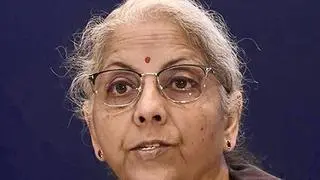The Budget for 2012-13 has a number of important measures for the banking sector.
Fresh infusion of funds, a sop for depositors (savings bank interest up to Rs 10,000 being given rebate) and by extension the banks, the opening of a new borrowing window for the airline industry are among the steps that are positive.
But to take the all important question – will banks cut rates any time soon? The answer: It doesn't seem likely in this quarter.
RECAPITALISATION
The Finance Minister announced a move to recapitalise public sector banks through infusion of Rs 15,888 crore.
Once upon a time, recapitalisation was a euphemism for a troubled bank getting bailed out by the Government. Today, recapitalising banks is the norm, especially after what has happened in the western world during the past three years. And now such funds come without the attached opprobrium, because they are done on a pre-emptive basis to strengthen banks to cope with growth challenges.
The recapitalisation is part of the Government's commitment to support public sector banks as they transition to Basel-III norms on capital adequacy. These norms will require banks to bring in larger amounts of capital on an ongoing basis for the next five years.
The Reserve Bank of India has provided a slightly more stringent guideline than what is applicable internationally – both with regard to the time frame as well as the amount of capital required. Given that the Government's shareholding in most public sector banks is fairly close to 51 per cent, this is going to be a recurring item in the Budget for the next few years.
ECB WINDOW – LET OTHERS SHARE THE MISERY!
Opening the External Commercial Borrowing (ECB) window for the beleaguered airline industry is ostensibly a positive for banks in India. The Minister has said that the airline industry will be allowed to borrow up to $1 billion.
The reduction in withholding tax to five per cent from 20 per cent on such interest payments is seen as a good incentive for overseas lenders. It is presumed that domestic lenders who have hitherto borne the difficult task of funding these airlines would get at least a small load off their backs.
Some banks have been forced to recognise these airline accounts as Non-Performing Assets (NPAs). The prospect of some fresh funds coming into the sector via the ECB route may offer banks hope – of eventually recovering a part of the money they have lent.
However, whether a foreign lender would be willing to shoulder the burden that the domestic market itself shuns is a moot point. And for the airlines themselves, raising money in the ECB market without strong financials or credit rating is not going to be an easy task. And it certainly won't come cheap.
With no realistic prospect of an immediate turnaround in either Kingfisher or Air India, this may prove to be one more of those steps that are announced for effect – rather than any ground level impact.
The Finance Minister did not give in to banks' demands for reducing the lock-in period for a bank deposit to be eligible for a tax rebate. Banks wanted it to be reduced to three years from the current five years.
Even now banks complain that they don't get long-term deposits. If the lock-in period had been reduced to three-years, then they might as well give up all hopes of garnering long duration deposits. And without these, infrastructure financing will remain a lukewarm foray.
SIGNAL ON INTEREST RATES
What is the signal from the Budget for interest rates?
Interest rates seemed to be peaking and a cut was imminent. If one went merely by the public pronouncements of monetary authorities till recently, there was a likelihood of an interest rate cut in April.
This was of course caveated with dozens of ‘ifs and buts', but principally contingent on some relief on the inflation front and some credible fiscal consolidation measures by the Government.
Considering that the Budget has some inflationary impulses (excise/service tax hikes), and taking into account the railway freight/fare hikes and oil price volatility, whether a sustainable drop in inflation will happen any time soon is doubtful.
The other major determinant for fiscal health – the Government's borrowing programme – has drawn a sceptical response from the market, at least initially.
Bond yields were up 20 basis points reflecting the markets' discomfort with the numbers put out.
It now seems that the ‘pause' may continue on the rate front for at least one more quarter. So India Inc may have to wait for relief.








Comments
Comments have to be in English, and in full sentences. They cannot be abusive or personal. Please abide by our community guidelines for posting your comments.
We have migrated to a new commenting platform. If you are already a registered user of TheHindu Businessline and logged in, you may continue to engage with our articles. If you do not have an account please register and login to post comments. Users can access their older comments by logging into their accounts on Vuukle.